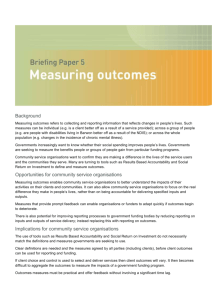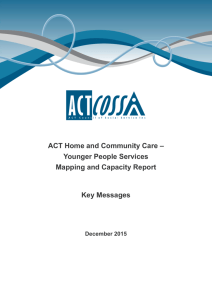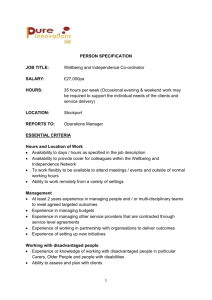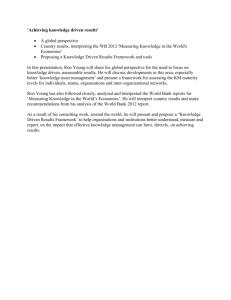this document (DOC) - Victorian Council of Social Service
advertisement
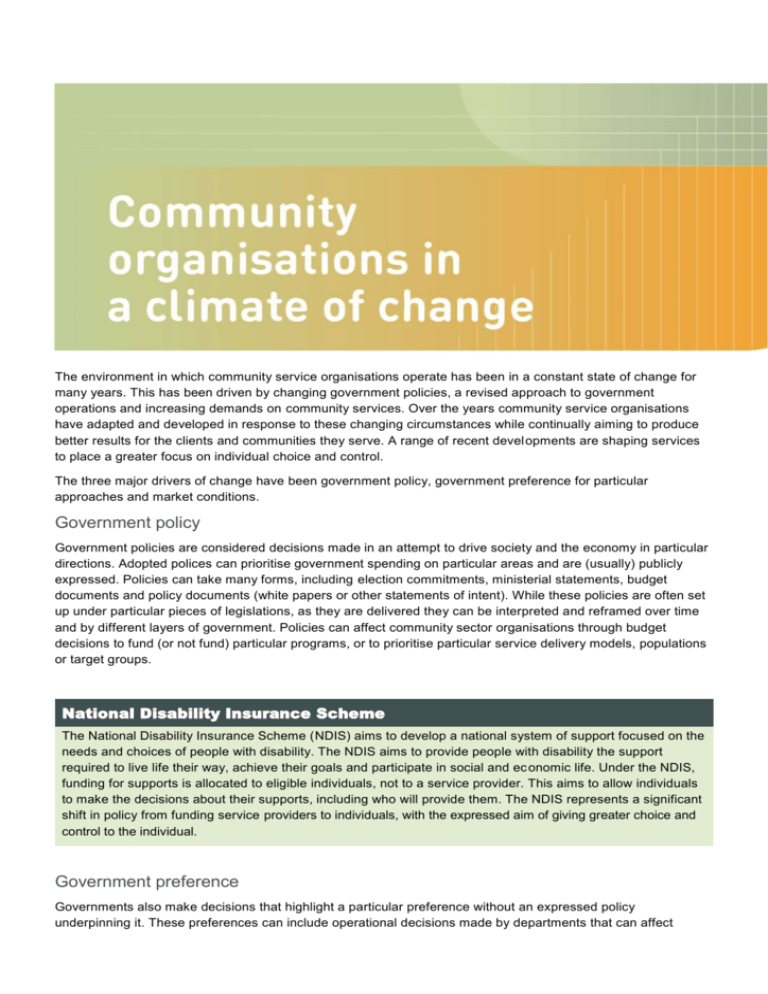
The environment in which community service organisations operate has been in a constant state of change for many years. This has been driven by changing government policies, a revised approach to government operations and increasing demands on community services. Over the years community service organisations have adapted and developed in response to these changing circumstances while continually aiming to produce better results for the clients and communities they serve. A range of recent devel opments are shaping services to place a greater focus on individual choice and control. The three major drivers of change have been government policy, government preference for particular approaches and market conditions. Government policy Government policies are considered decisions made in an attempt to drive society and the economy in particular directions. Adopted polices can prioritise government spending on particular areas and are (usually) publicly expressed. Policies can take many forms, including election commitments, ministerial statements, budget documents and policy documents (white papers or other statements of intent). While these policies are often set up under particular pieces of legislations, as they are delivered they can be interpreted and reframed over time and by different layers of government. Policies can affect community sector organisations through budget decisions to fund (or not fund) particular programs, or to prioritise particular service delivery models, populations or target groups. National Disability Insurance Scheme The National Disability Insurance Scheme (NDIS) aims to develop a national system of support focused on the needs and choices of people with disability. The NDIS aims to provide people with disability the support required to live life their way, achieve their goals and participate in social and ec onomic life. Under the NDIS, funding for supports is allocated to eligible individuals, not to a service provider. This aims to allow individuals to make the decisions about their supports, including who will provide them. The NDIS represents a significant shift in policy from funding service providers to individuals, with the expressed aim of giving greater choice and control to the individual. Government preference Governments also make decisions that highlight a particular preference without an expressed policy underpinning it. These preferences can include operational decisions made by departments that can affect community sector organisations. At times these decisions can be interpreted as policy. For example decisions regarding who receives funding under a program, the manner in which services are funded (e.g. competitive tendering is seen to favour large organisations over small), and the accountability and perf ormance requirements of departments through service agreements. However, often such decisions are not an expressed policy of government but are operational decisions of departments attempting to deliver government preferences. Mental health recommissioning When the Victorian Government sought to reform community mental health services in 2014 the Department of Health chose to use competitive tendering to source service providers. This type of tendering can have both intended and unintended consequences. The intended consequences for government can be to test the market, get the best value for money and create transparency. The unintended consequences, as reported by community mental health providers, included disruption to services for vulnerable clients, additional costs to prepare tenders, reduced staff morale through funding uncertainty, and competitive processes undermining collaboration in the sector. Other options were available to the government to manage the reform process but were not chosen. This represented a preference by a government agency rather than a defined policy position of government. Market conditions A ‘market’ is a place or medium that allows buyers and sellers of goods or services to exchange those goods or services. Community sector organisations operate in various ‘markets’ to provide their services. Some are fair ly traditional markets, where the client pays a fee to access the service. The fee might be subsidised by government. In other markets the funding for the service comes from government to the organisation. Some markets are highly regulated and organisations are prescribed the number of, and nature of, their clients. In these markets, conditions are dictated by service agreements, targets and other program constraints required by government. That is, government determines who is eligible for services and the nature of the service provided. Other markets are less regulated and government has less control over people’s access to services and the nature of the services provided. ‘Market conditions’ are those factors that affect the supply and demand for the goo d or service. Changes in market conditions include an ageing population and an increasingly culturally diverse population. A key trend is that the demand for services, particularly by an ageing population, is higher than the supply of government funding to support the population. Therefore organisations need to either diversify their revenue streams, including fee for service, to meet this demand, or cut services to meet the level of funding. Recent changes in environmental conditions Recent significant changes in the environmental conditions community organisations are operating in include: • government focus on client choice and client control • use of purchase of service arrangements by government to specify service delivery • increasing focus on local area governance • measurement of outcomes • funding constraints • increasing demand for services • more clients with multiple and complex needs These environmental conditions affect organisations’ governance and management as well as service delivery. Organisations need to consider what the changes mean for them and question whether they can remain viable in the changed circumstances. Organisations may need to reconfigure their operations to survive. They may need to attract staff with new skills and knowledge to adapt to the new environment. There may be great opportunities for organisations to grow and enhance their services to better meet the needs of clients and communities. This series of short briefing papers explores these issues. The papers aim to give community organisations an overview of changes happening across the ageing, disability and mental health sectors, as well as highlighting the key implications and opportunities they present for community sector organisations. Prepared by the Victorian Council of Social Service (VCOSS) in consultation with members of the Ageing, Disability and Mental Health Collaborative Panel, which comprises the Australian Federation of Disability Organisatio ns (AFDO), Carer’s Victoria, Council on the Ageing (COTA) Victoria, Ethnic Communities’ Council of Victoria (ECCV), National Disability Services (NDS), Psychiatric Disability Services of Victoria (VICSERV) and VCOSS.
